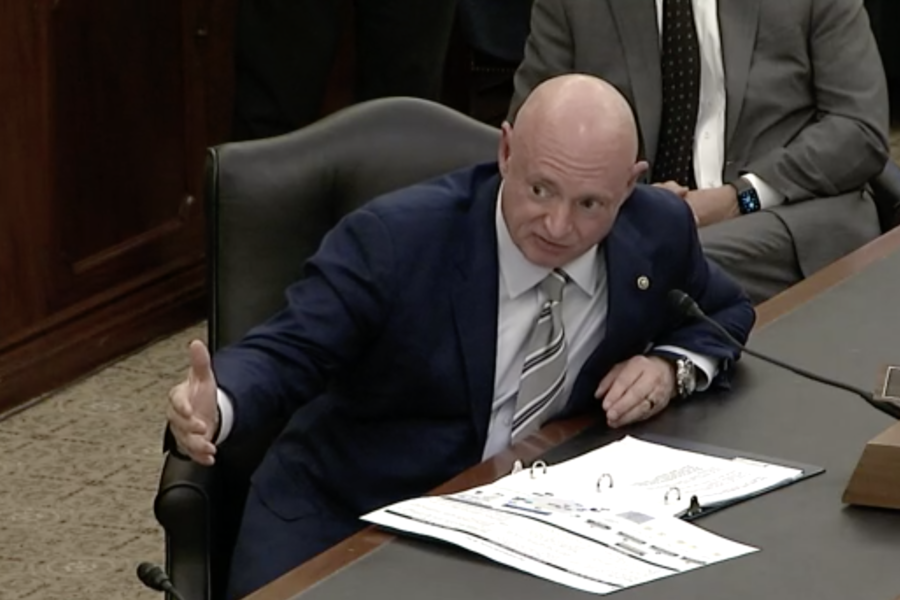A first-year senator may perceive the perils of space debris multiplying in low-Earth orbit from a more visceral vantage point than the Space Force or Defense Department officials who testified May 26 on threats to U.S. military activities in space.
“With regards to LEO [low-Earth orbit], in particular, do you—as we’re tracking relatively small objects [debris], there’s thousands of them—when you get a state vector on one of those and you can see that’s it’s going to approach not only our ally’s, but sometimes our adversary’s, satellites in orbit, … do you always share that information? Because there’s also benefit for us,” said Sen. Mark Kelly (D-Arizona), a retired Navy pilot who flew or commanded four space shuttle missions and is a member of the Senate Armed Services subcommittee on strategic forces. Kelly said sharing such information gives any satellite operator, even an adversary, a chance to maneuver out of the way and not contribute more debris from a crash.
Space Force Vice Chief of Space Operations Gen. David D. Thompson said the USSF’s 18th Space Control Squadron does “that deconfliction” anytime it’s aware of such a close approach. Then John Hill, who is performing the duties of assistant secretary of defense for space policy, added that while most space operators “are very glad to engage with us … there are two countries that often don’t pick up the phone or answer the email.” He later specified that he meant China and Russia.
Kelly had assumed the DOD would have a “direct line” to a Russian agency, for example, in such an event. “So, they don’t respond when there’s a conjunction?” Kelly asked incredulously.
“We have established communications in some circumstances—it’s not 100 percent” radio silence, Hill said, not specifying whether he meant China, Russia, or both. “We end up having to use diplomatic channels, and it’s a much more complicated process.”
Referring to an earlier remark on counterspace threats, Kelly said a Chinese anti-satellite weapon test in 2007 that created a debris field had “presented an interesting problem” for him.
“I was the commander of the space shuttle on the very next shuttle mission to launch, and it became an issue. I had to maneuver the space shuttle out of the way of some of that debris. And it presents an increasingly complex hazard,” Kelly said.
The officials briefed members on counterspace threats including anti-satellite missiles and directed-energy weapons, as well as the lack of accepted norms of behavior in space. Thompson characterized China’s and Russia’s pursuits of counterspace technology as “attempting to take … away from us” existing abilities to conduct communications and surveillance, for example, from space.
Sen. Jacky Rosen (D-Nevada) wanted to know how the Space Force plans to defend against cyberattacks on space systems. Thompson said the service is assessing “bolt-on” cyber defenses for existing platforms “when and where and how we can.” And unlike in the past, when cybersecurity in space wasn’t necessary, the USSF will “absolutely design our systems” with “a cyber threat in mind,” he said.
“Then the third piece is, we’re building out what we call mission defense teams,” Thompson said. “Those are cyber defense teams for every system, for every operational organization, who understand the cyber capabilities, are highly trained in defense, and [are] hunting and finding threats and addressing them and providing that first line of defense.”
Thompson went over some of the DOD’s and Department of the Air Force’s organizational plans for the Space Force, saying that as of the hearing, the USSF had about 6,400 uniformed members. About 6,000 of those transferred in from the Air Force plus there are interservice transfers now underway and another 218 officers entering from the Air Force Academy’s 2021 graduating class. About 6,000 civilian employees are also assigned to the Space Force.
Meanwhile, the USSF has activated its first of three field commands, the Space Operations Command, and plans to stand up both the Space Systems Command and Space Training and Readiness Command in 2021, Thompson said.
